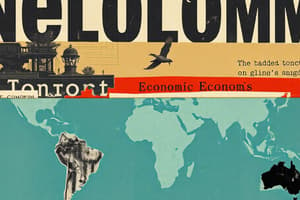Podcast
Questions and Answers
What does neoliberalism primarily advocate for?
What does neoliberalism primarily advocate for?
- Protectionist economic policies
- Increased government regulation of markets
- Enhanced public sector intervention
- Free-market capitalism and reduced government spending (correct)
What was a significant shift in the World Bank's policies during the 1980s?
What was a significant shift in the World Bank's policies during the 1980s?
- Embracing neoliberal frameworks (correct)
- Decreased funding for low-income countries
- A focus solely on public health initiatives
- Implementation of social welfare programs
Which term describes the conditions imposed by the World Bank for lending money to countries in crisis?
Which term describes the conditions imposed by the World Bank for lending money to countries in crisis?
- Structural Adjustment Policies (SAPs) (correct)
- Neoliberal Economic Frameworks
- Fiscal Responsibility Agreements
- International Financial Aid Conditions
How does neoliberalism influence education policy in the United States?
How does neoliberalism influence education policy in the United States?
In the context of HIV programming in Malawi, who are the key stakeholders identified?
In the context of HIV programming in Malawi, who are the key stakeholders identified?
What significant concern did the World Bank show in the 1970s regarding health in low-income countries?
What significant concern did the World Bank show in the 1970s regarding health in low-income countries?
What are the themes in the AIDS enterprise as highlighted in the Watkins and Swidler case study?
What are the themes in the AIDS enterprise as highlighted in the Watkins and Swidler case study?
What is a major criticism of NGO practices in health projects?
What is a major criticism of NGO practices in health projects?
What was the primary reason for countries to accept SAPs during the economic crash of the 1970s?
What was the primary reason for countries to accept SAPs during the economic crash of the 1970s?
What was the primary goal of the non-profit created by the individual discussed?
What was the primary goal of the non-profit created by the individual discussed?
What is a key issue with the PlayPump project as reported?
What is a key issue with the PlayPump project as reported?
What critique does Hobbs have regarding the Millennium Development Villages?
What critique does Hobbs have regarding the Millennium Development Villages?
How did the Deworm the World project measure effectiveness?
How did the Deworm the World project measure effectiveness?
What is a common issue noted about AID workers in Mozambique?
What is a common issue noted about AID workers in Mozambique?
What is one of the key recommendations put forth in Hobbs's critique of the aid industry?
What is one of the key recommendations put forth in Hobbs's critique of the aid industry?
Which statement best describes the AID 'cowboys' and 'mercenaries'?
Which statement best describes the AID 'cowboys' and 'mercenaries'?
What is the argument presented by Hickel regarding the flow of wealth in global health?
What is the argument presented by Hickel regarding the flow of wealth in global health?
What impact did structural adjustment programs have on Mozambique's health system?
What impact did structural adjustment programs have on Mozambique's health system?
Which of the following describes 'ritual objects' used in global health training?
Which of the following describes 'ritual objects' used in global health training?
What should happen to the debts owed by poorer countries according to Hickel's argument?
What should happen to the debts owed by poorer countries according to Hickel's argument?
What characterized the cultural response to orphans and vulnerable children in the context of AIDS?
What characterized the cultural response to orphans and vulnerable children in the context of AIDS?
Which statement best describes the situation in Mozambique's health system after gaining independence?
Which statement best describes the situation in Mozambique's health system after gaining independence?
What role do 'ritual spaces' play in global health training?
What role do 'ritual spaces' play in global health training?
What did the AIDS enterprise culture surround in relation to empowering vulnerable women?
What did the AIDS enterprise culture surround in relation to empowering vulnerable women?
What does the concept of 'accompaniment' in global health emphasize?
What does the concept of 'accompaniment' in global health emphasize?
What was one of the major criticisms of the aid provided to Haiti after the earthquake?
What was one of the major criticisms of the aid provided to Haiti after the earthquake?
Which of the following is NOT one of the types of failures mentioned in relation to global health initiatives?
Which of the following is NOT one of the types of failures mentioned in relation to global health initiatives?
How can RUTF (Ready-to-Use Therapeutic Food) be improved in treating malnutrition in Haiti?
How can RUTF (Ready-to-Use Therapeutic Food) be improved in treating malnutrition in Haiti?
What principle drives the argument for ensuring a 'preferential option for the poor' in global health initiatives?
What principle drives the argument for ensuring a 'preferential option for the poor' in global health initiatives?
What is the perspective called that considers cultural, economic, and psychological contexts affecting health and illness?
What is the perspective called that considers cultural, economic, and psychological contexts affecting health and illness?
What is the main focus of medical anthropologists regarding health and illness?
What is the main focus of medical anthropologists regarding health and illness?
What does the term 'cultural relativism' imply?
What does the term 'cultural relativism' imply?
How does Kleinman differentiate between illness and disease?
How does Kleinman differentiate between illness and disease?
What does the 'voice of medicine' refer to?
What does the 'voice of medicine' refer to?
Which concept addresses the social and cultural aspects influencing health risks?
Which concept addresses the social and cultural aspects influencing health risks?
What does iatrogenic harm refer to?
What does iatrogenic harm refer to?
What is a limitation mentioned in regards to the book 'The Spirit Catches You and You Fall Down'?
What is a limitation mentioned in regards to the book 'The Spirit Catches You and You Fall Down'?
What was a major criticism of universal metrics in global health according to Adams?
What was a major criticism of universal metrics in global health according to Adams?
How do QALYs measure health outcomes?
How do QALYs measure health outcomes?
What is a key focus of the DALY metric?
What is a key focus of the DALY metric?
Why might enrolling in a randomized control trial (RCT) be significant for individuals in low-income countries?
Why might enrolling in a randomized control trial (RCT) be significant for individuals in low-income countries?
What aspect of metrics does Hobb criticize in relation to development?
What aspect of metrics does Hobb criticize in relation to development?
What is a common challenge noted regarding the creation of metrics in global health?
What is a common challenge noted regarding the creation of metrics in global health?
Which statement best captures the critique of randomized control trials (RCTs)?
Which statement best captures the critique of randomized control trials (RCTs)?
What is the view of metrics in relation to politics of health as expressed in the document?
What is the view of metrics in relation to politics of health as expressed in the document?
Flashcards
Cultural Relativism
Cultural Relativism
The understanding that different cultures have different ways of viewing and explaining health and illness.
Ethnocentrism
Ethnocentrism
The tendency to judge other cultures based on one's own cultural standards.
Enculturation
Enculturation
The process of learning and internalizing the values, beliefs, and practices of a culture.
Explanatory Model
Explanatory Model
Signup and view all the flashcards
Voice of Medicine
Voice of Medicine
Signup and view all the flashcards
Voice of the Lifeworld
Voice of the Lifeworld
Signup and view all the flashcards
Iatrogenic Harm
Iatrogenic Harm
Signup and view all the flashcards
Culture of No Culture
Culture of No Culture
Signup and view all the flashcards
Neoliberalism
Neoliberalism
Signup and view all the flashcards
Free Market Capitalism
Free Market Capitalism
Signup and view all the flashcards
Structural Adjustment Policies (SAPs)
Structural Adjustment Policies (SAPs)
Signup and view all the flashcards
Health as a Human Right
Health as a Human Right
Signup and view all the flashcards
Global Health
Global Health
Signup and view all the flashcards
Cultural Sensitivity in Global Health
Cultural Sensitivity in Global Health
Signup and view all the flashcards
Watkins and Swidler HIV Case Study
Watkins and Swidler HIV Case Study
Signup and view all the flashcards
AIDS Enterprise
AIDS Enterprise
Signup and view all the flashcards
Aid to Accompaniment
Aid to Accompaniment
Signup and view all the flashcards
Preferential Option for the Poor
Preferential Option for the Poor
Signup and view all the flashcards
Failures of Implementation
Failures of Implementation
Signup and view all the flashcards
Failures of Imagination
Failures of Imagination
Signup and view all the flashcards
Accompaniment as a Solution
Accompaniment as a Solution
Signup and view all the flashcards
NGOs undermining health systems
NGOs undermining health systems
Signup and view all the flashcards
AID Cowboys & Mercenaries
AID Cowboys & Mercenaries
Signup and view all the flashcards
Code of Conduct for Aid Organizations
Code of Conduct for Aid Organizations
Signup and view all the flashcards
Lack of Cultural Humility & Competence
Lack of Cultural Humility & Competence
Signup and view all the flashcards
Radi-Aid Parody
Radi-Aid Parody
Signup and view all the flashcards
Hobbs' Critique of the Aid Industry
Hobbs' Critique of the Aid Industry
Signup and view all the flashcards
Structural Causes of Poverty
Structural Causes of Poverty
Signup and view all the flashcards
Randomized Controlled Trials (RCTs)
Randomized Controlled Trials (RCTs)
Signup and view all the flashcards
Aid in Reverse
Aid in Reverse
Signup and view all the flashcards
Debt Forgiveness for Developing Countries
Debt Forgiveness for Developing Countries
Signup and view all the flashcards
Structural Adjustment Programs
Structural Adjustment Programs
Signup and view all the flashcards
Reciprocity of Care
Reciprocity of Care
Signup and view all the flashcards
Mozambique's Primary Healthcare System
Mozambique's Primary Healthcare System
Signup and view all the flashcards
Rituals in Global Health Training
Rituals in Global Health Training
Signup and view all the flashcards
The Rituals of Global Health
The Rituals of Global Health
Signup and view all the flashcards
The Flow of Wealth Around the World
The Flow of Wealth Around the World
Signup and view all the flashcards
Metrics in Global Health: Colonial Legacy
Metrics in Global Health: Colonial Legacy
Signup and view all the flashcards
What is a QALY?
What is a QALY?
Signup and view all the flashcards
What is a DALY?
What is a DALY?
Signup and view all the flashcards
Critique of Metrics: Shaping Priorities
Critique of Metrics: Shaping Priorities
Signup and view all the flashcards
What is an RCT?
What is an RCT?
Signup and view all the flashcards
Critique of RCTs: Ethics and Access
Critique of RCTs: Ethics and Access
Signup and view all the flashcards
The 'Less Problematic' Measure Illusion
The 'Less Problematic' Measure Illusion
Signup and view all the flashcards
Nigeria Case Study: Metrics and Research
Nigeria Case Study: Metrics and Research
Signup and view all the flashcards
Study Notes
Midterm Study Guide
- The midterm exam covers all course readings, lectures, films, and other materials from weeks 1-6 of the course.
Intersectionality
- Intersectionality is the interconnection of personal identities (race, class, gender) that affect lived experiences and disadvantages.
- It's not a single axis analysis.
- Social determinants of health vary across income levels. Lower socioeconomic positions are associated with worse health outcomes.
Medical Pluralism
- Medical pluralism involves understanding health through multiple systems or traditions, such as Western medicine, holistic medicine, and Chinese medicine.
- Example: Curanderismo.
Bending the Arc
- The excerpt involves working with community members to incorporate their culture into a clinic or hospital.
- It highlights structural analysis, critiques of white saviorism, taking leadership from community members, and bridging resources.
- Father Fitzs is a key figure in the case study, focusing on Haiti.
Global Health
- Global health seeks to reduce health inequalities by addressing major issues like income, location, and access to healthcare.
- It helps understand how these factors influence healthcare access, disease spread, and resource distribution worldwide.
Anthropological Lens
- An anthropological perspective considers cultural, economic, and psychological contexts that impact health and illness.
- This view helps understand why certain health behaviors continue, how cultural beliefs influence medical treatment, and how health is influenced by cultural, economic and psychological contexts.
Culture and Enculturation
- Anthropologists use culture and enculturation to understand health and illness. It refers to the way people learn beliefs and behaviours that shape their lives.
- Cultural relativism versus ethnocentrism are key concepts, and medical anthropologists consider culture when studying health and illness to look at how culture influences the way health is understood and practiced.
- Medical anthropologists use cultural perspectives to understand how different social, economic, political, and ecological factors influence health risks.
Illness vs. Disease
- Illness refers to how patients and their families perceive, live with, and respond to symptoms, while disease is what a practitioner creates when casting illness into health theories.
- Explanatory models are key concepts in understanding the relationship between the voice of medicine and the voice of the lifeworld.
Iatrogenic Harm
- Understanding the cultures and rituals of biomedicine, including the history of biomedicine, the concept of iatrogenic harm, and characteristics of a 'culture of no culture'.
The Spirit Catches You and You Fall Down
- Explores the clash between Western medicine and Hmong cultural beliefs, focusing on a young Hmong girl, Lia Lee, who suffers from epilepsy.
- Highlights cross-cultural communication in healthcare and illustrates the potential harm associated with a lack of cultural sensitivity in patient care.
Structural Violence
- Social arrangements that place individuals and populations at risk are called structural violence. They are embedded in political and economic systems.
- Health is affected by inequalities that are deeply embedded in society.
- Social, political, economic forces shape populations' health and access to care.
Structural Competency
- The ability to understand cultural expressions of illness and health, and to then counteract marginalization based on race, ethnicity, socioeconomic status, sexual orientation or other markers of difference.
- This requires cultural humility.
Illness and Disease
- Understanding the differentiation between illness and disease.
- Understanding the concept of 'explanatory models' how they are used in healthcare.
- Understanding the relationship between the patient's and health professional's perspectives.
Readings
- Be familiar with case studies from the assigned readings; Brown & Closser, Farmer, Ehrenreich, Taylor, Singer & Erickson, Kleinman, Fadiman, and Wendland, which discuss relevant issues.
Upstream & Downstream Determinants
- Upstream determinants are large-scale structural issues impacting communities and create barriers.
- Downstream factors directly affect an individual's health
Global Health
- Understand the history of global health, the development, impact and critiques of neoliberalism. (Free market capitalism, deregulation, reduction in government spending).
Aid
- Examine the case study of aid in Mozambique and various critiques of aid work, including those made by Hobbs.
Metrics in Global Health
- Understand Adam's critique of metrics in global health and Oni-Orisan's related case study set in Nigeria (critiques of universalism, the QALY and DALY, and the way that the need to produce metrics shapes global health).
Colonialism and Global Health
- Understand the dynamics of colonialism as a social determinant of health, and consider the case study from Canada.
- Be familiar with approaches for decolonizing global health.
Aid to Accompaniment
- Understand the concept of "aid to accompaniment" and its alternative approaches towards global health.
- Critiques of the existing aid system and its failures are needed.
Studying That Suits You
Use AI to generate personalized quizzes and flashcards to suit your learning preferences.
Related Documents
Description
This quiz explores key concepts related to neoliberalism, its impact on global health policies, and the roles of various stakeholders in health initiatives. Participants will also examine the criticisms of NGO practices and significant shifts in World Bank policies that have influenced low-income countries. Test your understanding of these global challenges and their implications.




